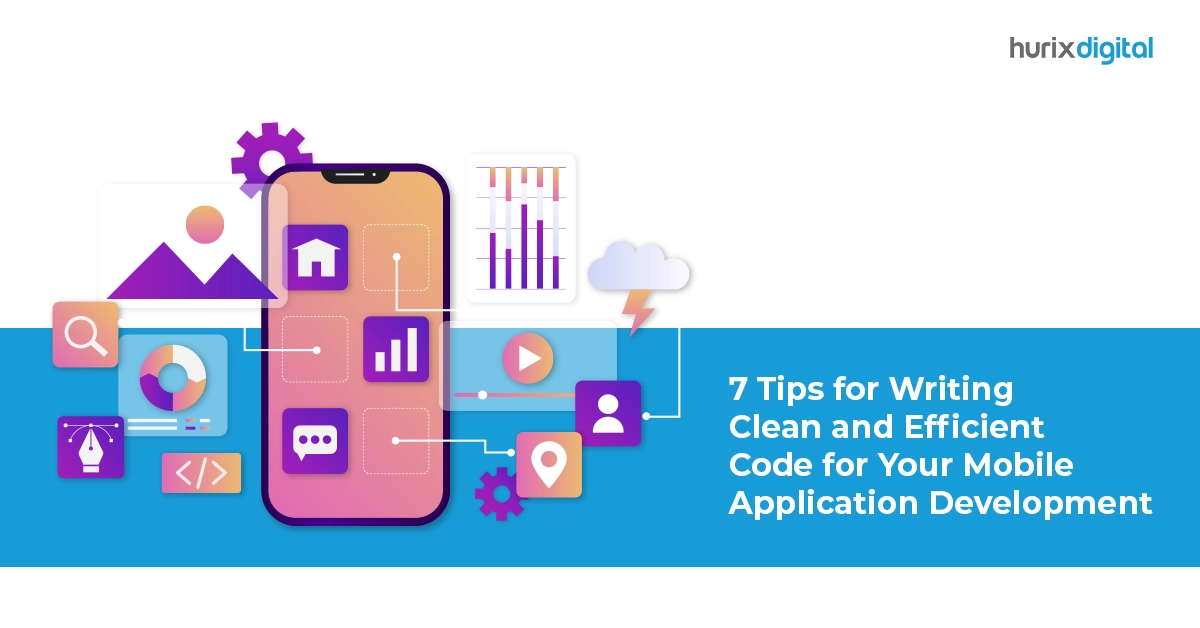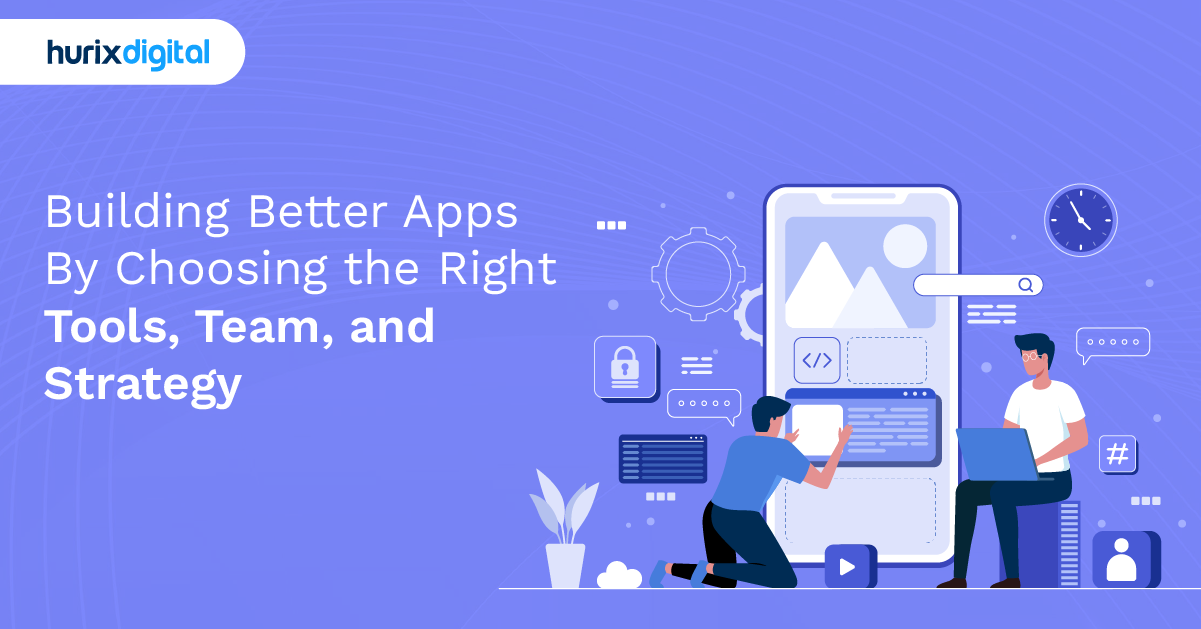
Building Better Apps By Choosing the Right Tools, Team, and Strategy
Summary
This blog explores app development strategies, emphasizing the importance of selecting the right company and offering metrics and crucial phases to ensure successful project outcomes.
Staying ahead of the curve is essential in app development. Technologies evolve rapidly, and developers need to adapt quickly to meet changing demands and user expectations.
As an app developer, all your efforts may go down the drain if someone else pre-empts your application with a similar architecture. Further, enterprise app developers need an array of tools in their arsenal to cater to the diverse requirements of the organization in accelerated mode.
Mobile apps are crucial for businesses to connect with their audience. Having a top-notch app can boost engagement and brand visibility as more people rely on smartphones. But with so many companies out there, finding the right one can be overwhelming.
In this post, we’ll explore some key metrics that you can consider when selecting the ideal mobile application development company for your projects. Let’s dive in!
Table of Contents:
- What is Enterprise Mobile App Development?
- 5 Key Challenges in Enterprise Mobile App Development
- Strategies to Explore for Seamless App Development
- Top 5 Tools to Improve Your App Development Efficiency
- Key Reasons to Hire Top Mobile App Development Companies
- Types of Mobile App Development Firms
- Metrics to Consider When Choosing the Top Mobile App Development Companies
- Crucial Phases in Hiring Top Mobile App Development Companies
- To Wrap Up
What is Enterprise Mobile App Development?
Enterprise mobile app development is the process of building a mobile application for a business-to-business target audience. The audience stakeholders can comprise employees, customers, vendors, and investors, to name a few.
Companies looking to grow quickly, efficiently, and cost-effectively and make data-driven decisions are investing in building enterprise mobile apps. Such apps boost employee productivity through onboarding, online training, and tracking progress.
They can help enhance specific functions, such as sales, communication, marketing, financial analysis, and supply chain management, at scale by increasing the potential to make data-driven decisions.
Enterprise apps that harness technologies like Artificial Intelligence (AI), Machine Learning (ML), automation, Optical Character Recognition (OCR), Augmented Reality/ Virtual Reality, and Natural Language Processing (NLP) help achieve these goals. The collective use of such technologies raises the capabilities of enterprise apps and helps offer a personalized user experience to the target audience.
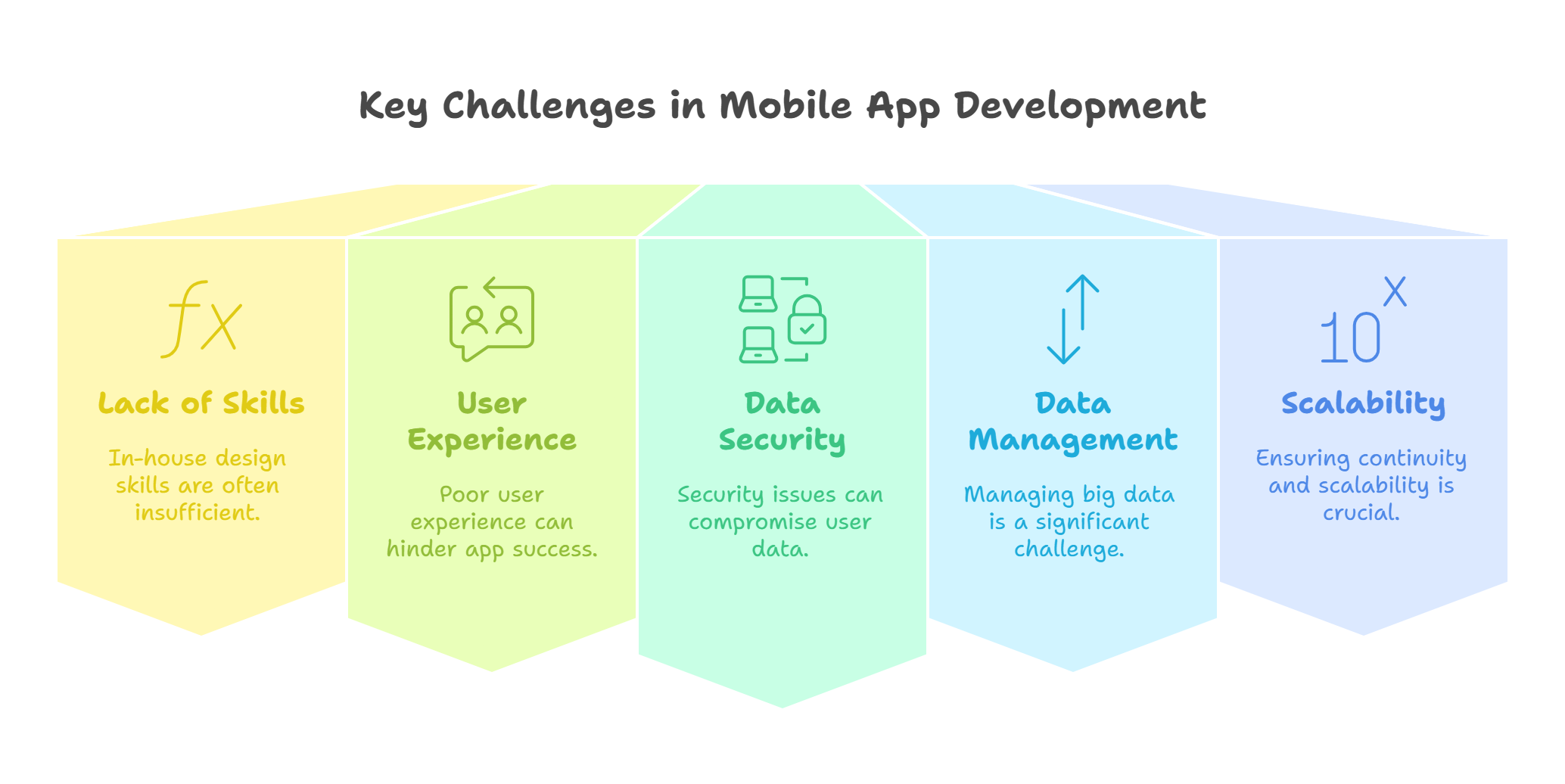
5 Key Challenges in Enterprise Mobile App Development
Here’s a snapshot of five common difficulties businesses face when developing a superior enterprise mobile app.
1. Lack of In-House App Design Skills
Businesses may need more resources to undertake an enterprise mobile app design project that requires very specific skills. Hiring a team from scratch is expensive.
Redeploying in-house technology talent with generic skills can lead to the creation of a sub-standard product. In-house teams only work if they have the skills and bandwidth to deliver.
2. Poor User Experience
B2B audiences expect a superior user experience, just like consumer tech apps. If the user experience of an enterprise app is not seamless, it can lead to a breakdown in business processes.
A key challenge for application development teams is building a seamless user experience that is intuitive to a user’s needs. It requires superior UX design skills and an in-depth understanding of the user’s needs to build an exceptional experience.
3. Lack of Data Security
Data security is one of the most important features of any world-class enterprise app because such apps generate large volumes of sensitive user data.
Types of data include identity details, financial data, and medical information, to name a few. As cyber-attack risks grow, ensuring that data is secure and not susceptible to such attacks is becoming more challenging.
4. Big Data Storage and Management
Enterprise apps generate massive amounts of data daily, which must be processed and stored securely. Businesses must make provisions to store data on a secure server.
Purchasing and maintaining servers is an expensive undertaking. Hence, businesses need to identify inexpensive means to process and store data, which will only increase in volume over time.
5. Continuity and Scalability
Developing and maintaining a world-class app is a continuous process. However, businesses find it challenging to continue the upkeep and innovation of apps that may be launched with enthusiasm.
An enterprise app must continually tune into the user’s journey, needs, and challenges. It needs ongoing innovation to address these elements while also scaling without crashing as the number of users grows.
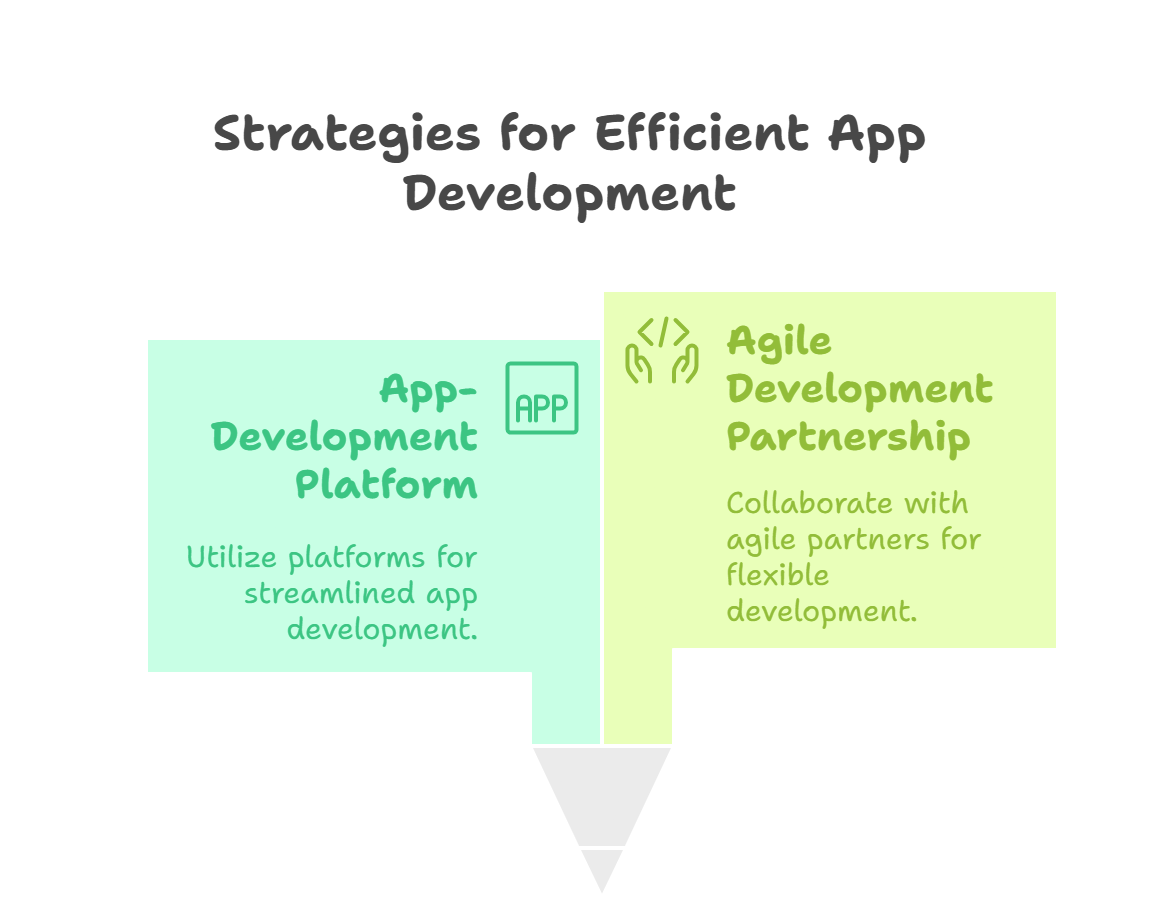
Strategies to Explore for Seamless App Development
Follow the strategies mentioned below to address the challenges effectively and ensure the successful development of your enterprise mobile app:
1. Leverage an App-Development Platform
Businesses looking to build their enterprises in-house can leverage an application development platform. Popular platforms include Android Studio, which offers tools and access to the newest Android features, and Xcode, which enables the design of apps for the iOS ecosystem.
However, most businesses today want to develop mobile enterprise application platforms that can be used across Android, iOS, and other operating systems.
Here are some examples of cross-platform options:
- React Native: Enables quick development and deployment across platforms using JavaScript and React.
- Flutter: This is Google’s framework, which utilizes Dart to build visually appealing, higher-performance apps for Android and iOS.
- Xamarin: This Microsoft-backed platform uses C# for development and helps build apps with a strong, good performance and a native-like feel.
While such platforms simplify the process of developing an enterprise app, in-house teams must have the app development skills and bandwidth to make it a user-friendly product with long-term value.
2. Partner with an Agile Enterprise App Development Company
Outsourcing the entire app development process to a specialist that offers an enterprise app development service can be a cost-effective solution for businesses.
Here are some key attributes to seek in a potential partner:
- Expertise: The app development team must have the skills to build a world-class enterprise app. These include all aspects of UX design, product management, and quality testing.
- Experience: Check for a proven track record of building superior enterprise apps for other businesses.
- Development Approach: App development teams must leverage agile, which paves the way for superior collaboration and adaptability as business goals evolve.
- A Transparent Framework: Mobile app development partners must establish a framework for transparency and communication throughout the project.
- Affordability: Ensure that the pricing model matches your budget. Account for how aspects such as development delays will impact the budget.
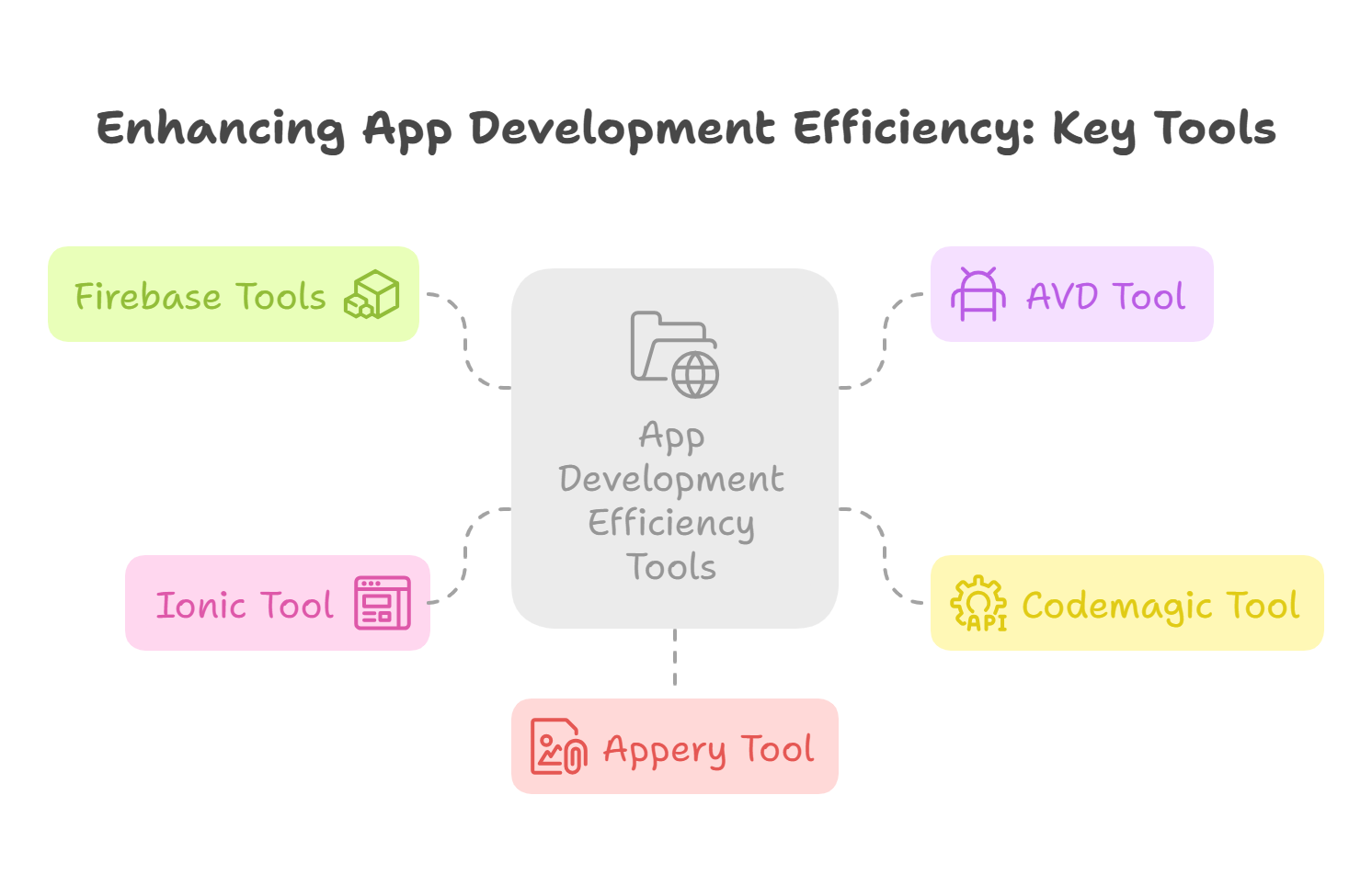
Top 5 Tools to Improve Your App Development Efficiency
You can supplement your adeptness in creating mind-blowing apps with the crucial tools discussed below. Your productivity and efficiency are bound to grow with them.
Below are the top 5 essential tools that can elevate your app development game:
1. Firebase Tools
These cutting-edge tools for accelerating and scaling app development are integrated into the Google-backed Firebase platform. The Google Cloud infrastructure powers them so your apps can reach the market quickly and at scale.
The key features of these mobile app development tools are:
- Ease of setting up of the backend without server management
- Prompt deployment of codes and assets in app projects
- Quick resolution of various problems related to app development
- Effortless scaling to support limitless users
- Offline data support to allow the app to function in offline mode
Here’s what you can do with these tools:
- Create Market-Ready Apps with Cloud Firestore: You can build secure and serverless apps at a mass scale with the Cloud Firestore tool. It helps you accomplish quick development due to its stellar features, like:
- Real-time Database: JSON data can be stored and synced between app users online or offline in real-time and in a highly secure way, making your apps serverless.
- Remote Configuration: The user experience during app building can be controlled and optimized dynamically by setting up feature flags in prototype mode.
- Firebase Extensions: These open-source, pre-packaged codes help improve app functionality by seamlessly integrating with the app’s architecture. They also save you from extensive coding and deployment hassles.
- App Security: There is a provision for validating the credentials of the source of incoming traffic. You can easily block abusive and irrelevant traffic.
- Secure Authentication: By adding end-to-end identity solutions, app users can be authenticated, signed in, and onboarded with minimum coding.
- Cloud Functions: You can script and run server-side app logic without setting up a server. The cloud infrastructure facilitates the transmission of messages across platforms between user devices and servers. As your app grows with a higher volume of user-generated content, the cloud seamlessly stores and serves the same.
- Hosting: Your apps are hosted on secure and quick-loading sites with global CDN.
- Machine Learning Features: Robust Firebase ML features facilitate the building of custom models and allow you to integrate your app with ready-to-deploy APIs.
2. AVD (Android Virtual Device) Tool
This emulator tool facilitates testing your Android apps on virtual devices with various configurations or specifications. By testing your app on various Android versions, you can streamline the Android app development process.
Here’s how you can level up your app development game with this tool:
- The AVD Tool emulates a wide range of Android devices, from smartphones and tablets to TVs, enabling comprehensive testing across different form factors.
- Hardware acceleration is supported, which facilitates quicker emulation and optimum performance.
- Easily configure AVDs to simulate various Android OS versions and API levels, allowing you to test your app’s compatibility and functionality across different Android environments.
- The tool is seamlessly integrated into the Android Software Development Kit (SDK) and is free, providing developers with a cost-effective solution for device testing and app optimization.
3. Codemagic Tool
This cloud-based CI/CD (Continuous Integration/Continuous Delivery) tool is used primarily for Flutter app development. Its workflow configurations and API offer versatility to teams building white-label apps.
The tool offers numerous advantages for developers looking to turbocharge the app-building process.
Here’s how Codemagic empowers developers to turbocharge the app-building process:
- Build, test, and deploy apps to stores like Google Play and iOS App Store in automated mode.
- Trigger new builds by pushing code to the repository, a process that also adds tags and merges pull requests
- Enhance the development team’s efficiency by configuring multiple workflows for the app, distributing the most recent build for testing, or sending it to production for publishing.
- Connect it to your self-hosted or cloud-based repositories.
- Clone your source code to create a separate virtual machine instance, destroy it instantly after completing the build, and encrypt it.
- Configure application workflows to integrate with third-party services for testing app performance on actual devices, detecting vulnerabilities, and checking code quality
- Extend configurations with Python scripts or open-source codes to sign and publish codes and control versioning.
- Benefit from CLI tools, Android Studio, Xcode, and other pre-installed software that expedites app building
- Scale up the app-building process by adding extra concurrencies for parallel runs.
4. Ionic Tool
This HTML5-based development tool expedites cross-platform app creation, testing, publishing, and monitoring. It leverages SASS, CSS, and HTML5 web technologies to build hybrid and interactive mobile apps. The preset JavaScript and CSS components are also handy.
You can utilize the Angular framework and integrate it with Ionic’s user interface library to streamline the development of cross-platform apps. The best thing is that it is open-source and customizable.
5. Appery Tool
Appery Tool, part of the Appery.io platform, is designed to simplify the creation of Progressive Web Apps (PWAs) and hybrid mobile applications. With its intuitive features, developers can leverage a code generator to build apps for Android, iOS, or Windows Phone with minimal coding effort.
The tool facilitates debugging and compatibility testing. The builder section offers tabs for model, storage, app settings, styles, templates, JavaScript, etc., to facilitate app development.
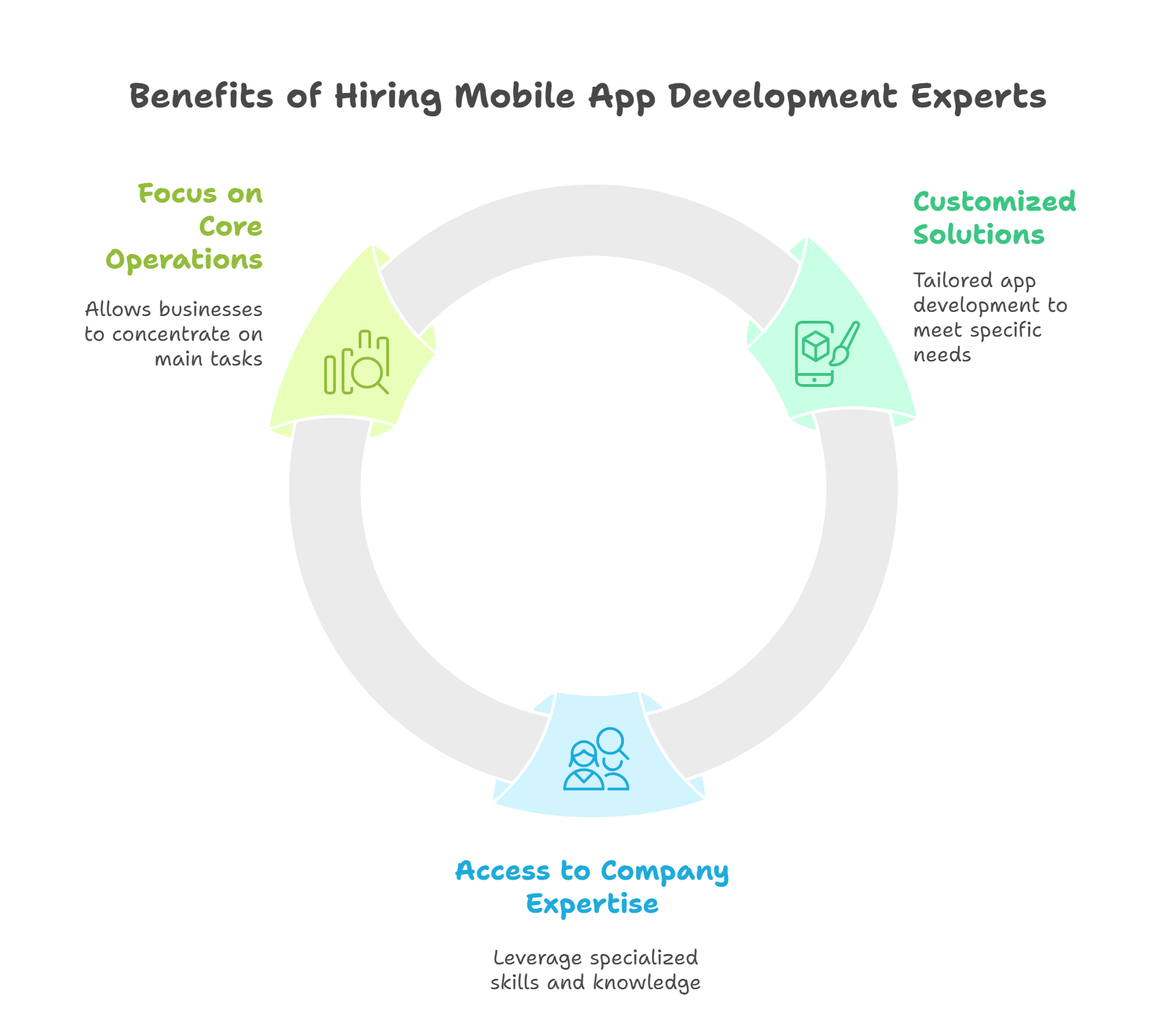
Key Reasons to Hire Top Mobile App Development Companies
Hiring one of the top mobile app development companies will enable you to outperform your competition quickly.
In addition, top mobile app development companies bring a wealth of experience and expertise to the table. Their seasoned professionals understand the nuances of app development, ensuring a streamlined and efficient process from conception to deployment.
Let’s understand the benefits of partnering with a top mobile app development company:
1. Customized Mobile App Development Solutions
Mobile app development companies specifically tailor their mobile apps to your brand’s needs. Before moving on to the app construction phase, the development team analyzes your needs and researches consumer expectations and industry difficulties.
They guarantee that the recently created mobile application aligns with your brand’s voice and tone in this way, assisting it in taking the lead in the market.
2. Access to Company Expertise
Hiring one of the top mobile app developers will allow you to take advantage of their years of experience and skill in developing a superior mobile application for your company.
Here, the developers are knowledgeable about the most recent developments in the mobile app development sector and thoroughly understand the various app development methodologies. As a result, the app they create will undoubtedly satisfy your business needs.
3. Focus on Core Operations
You and your team may make better use of your valuable time by outsourcing the creation of your mobile app to the top mobile app development companies, freeing up time for other crucial business tasks.
It will increase the efficiency of your company and assist you in meeting your future expansion and brand goals. This way, you can focus on your core operations and strategic initiatives, such as product development, marketing strategies, customer acquisition, and enhancing overall business processes.
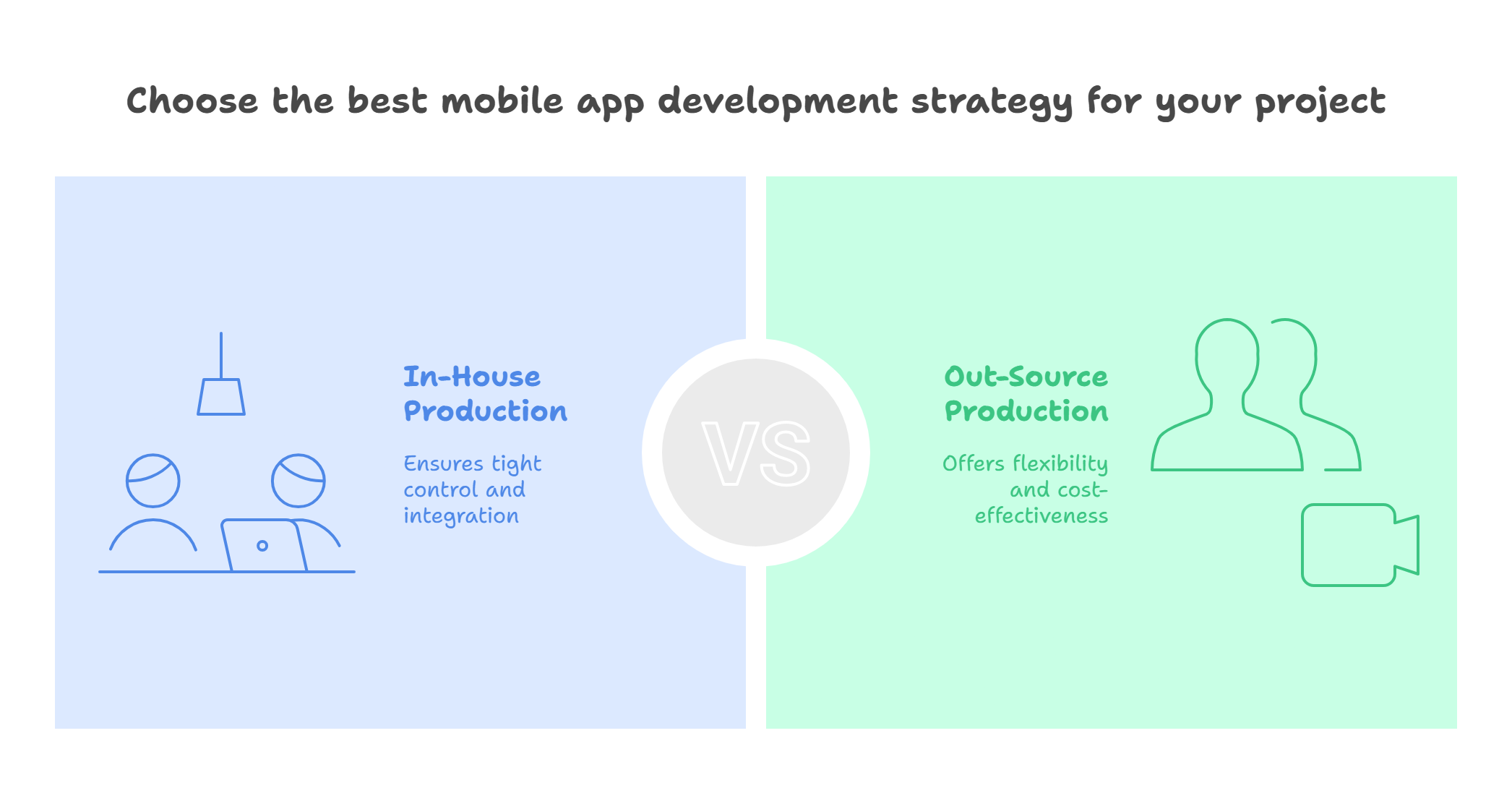
Types of Mobile App Development Firms
Primarily, there are two types of mobile app development companies in the market: big app development companies, independent freelancers, and tiny startups.
Both segments offer the capability to craft feature-rich mobile applications, yet they differ notably in their approach, technology stack, and pricing structure.
1. Companies Supporting In-House Production
Numerous businesses in the market handle every step of the process, including designing, creating, testing, and distributing apps. These businesses charge exorbitant fees, and most of the app development team members are company employees.
2. Companies Supporting Out-Source Production
These businesses provide more freedom than corporations that recruit specialists on an internal basis because they hire professionals on a freelance basis. They impose reasonable prices on the customers to ensure efficient use of resources and cost-effectiveness.
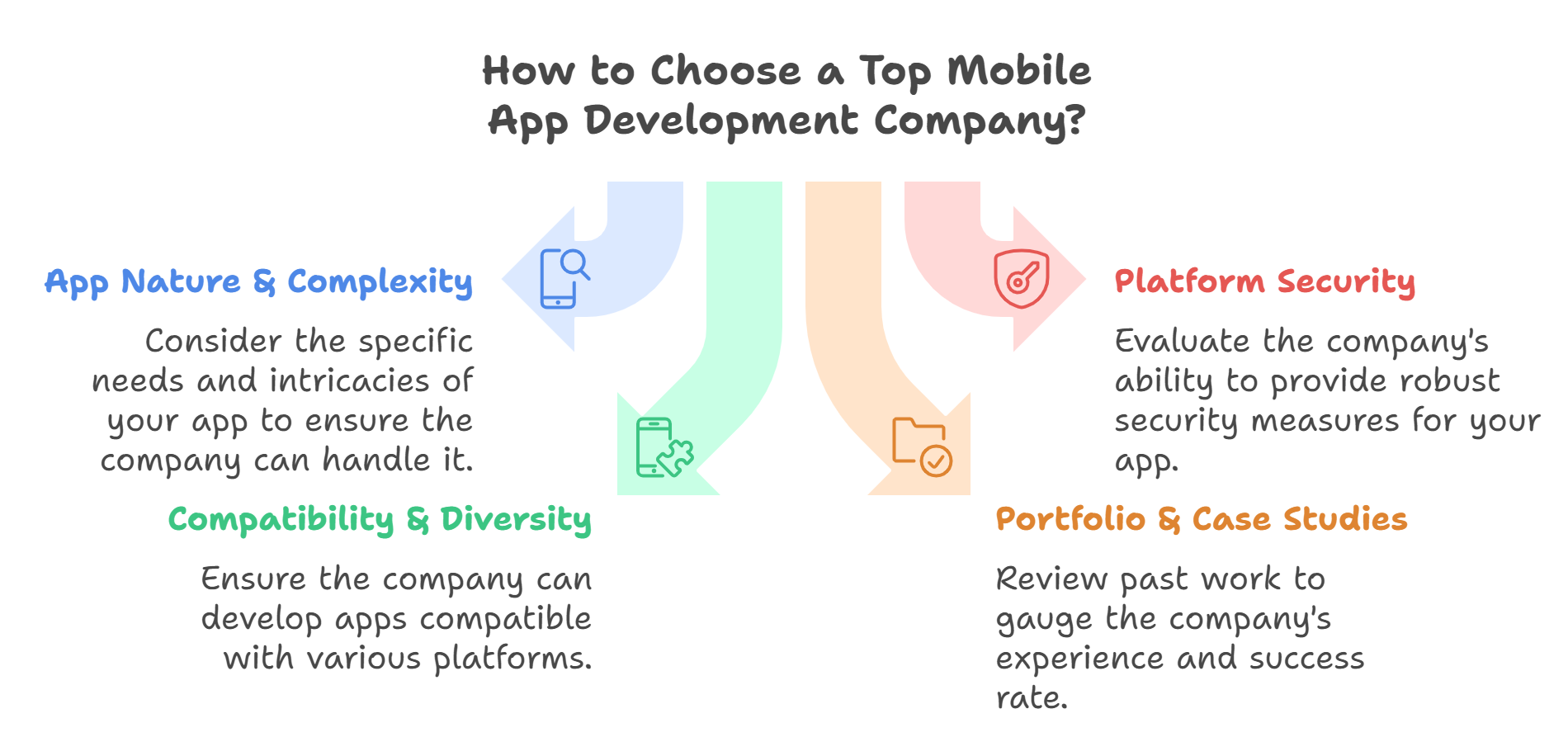
Metrics to Consider When Choosing the Top Mobile App Development Companies
The following list includes some of the most important metrics you should take into account when selecting a company to create your mobile app:
1. Nature and Complexity of Your App
You should always consider the main features of the mobile application you want to create and how it benefits users. In addition, it’s important to consider the devices and operating systems on which the app will run.
The fact that customers frequently switch displays or devices should be taken into consideration when investing in an app company. As a result, the app needs to work with the most recent iterations and devices that use cutting-edge technology.
2. Platform Security
One of the most delicate topics for any firm that has yet to release its mobile applications is security. To keep you and your staff safe, your app needs to safeguard user data and information from outside intrusions.
The following list includes some of the usual yet important security aspects that you should check for in the products offered by a mobile app development company:
- Data Encryption
- Identity Authentication
- System Monitoring Features
- User Access
- Auditing
- Role-Based Access Control
3. Platform Compatibility and Diversity
Determine the target platforms for your app—iOS, Android, or cross-platform. Ensure that the development company has expertise in developing for your chosen platforms and can optimize the app’s performance across various devices and screen sizes.
4. Portfolio and Case Studies
Review the company’s portfolio and case studies of past projects. Evaluate their previous work’s quality, diversity, and relevance to gauge their creativity, design sensibility, and ability to deliver successful apps.
A portfolio assessment is necessary because of the company’s ability to create visually appealing apps and to ensure they have experience developing apps similar to yours. This demonstrates their understanding of your industry and target audience, increasing the likelihood of a successful collaboration.
Crucial Phases in Hiring Top Mobile App Development Companies
According to research, mobile app development market revenue is projected to reach $673.79 billion by 2027. This figure unmistakably shows how competitive the market’s various mobile app development companies are becoming.
Follow the step-by-step process below to navigate through the crucial phases of hiring one of the top mobile app development companies:
- Examine the technology and app development experience of the numerous mobile app development companies available in the market.
- Verify the mobile app development firm’s websites and portfolios
- Request insightful information from your professional and social networks.
- Analyze the sincere testimonials left by satisfied customers
- Compare the prices that two or more companies are offering
- Schedule an online meeting for a mobile app development company that fits your brand’s criteria.
- Let the mobile app development firm know about the project’s timeframe, budget, and scope.
- Request a product demo before hiring a mobile app development company.
- Clearly articulate your project requirements, including the app’s creation goals, target market, essential features, and any other pertinent information.
- Ensure the mobile app development firm understands your vision and objectives to deliver a tailored solution that meets your needs.
To Wrap Up
Building a superior enterprise mobile app requires planning, expertise, and skills. This is a long-term investment in the company’s business goals. Hence, teams can consider partnering with an experienced enterprise app development company to conceptualize and execute a superior product. This is a cost-effective, efficient approach to enterprise app development.
If your business is looking to develop an enterprise mobile app, consider partnering with Hurix Digital. From embracing cross-platform and hybrid development to leveraging the latest technologies, we offer expertise to help you overcome challenges and achieve your business objectives.
Contact us for more info!

Currently serving as the Vice President of Technology Delivery Operations at HurixDigital, a prominent global provider of digital content and technology solutions for publishers, corporations, and educational institutions. With over 16 years of experience spanning EdTech and various domains, I hold certification as a SCRUM Product Owner (CSPO). My expertise includes operations, finance, and adept people management skills.

